About 500 Burmese activists demonstrated yesterday outside their country’s embassy in Malaysia, demanding that Myanmar’s military regime call off its constitutional referendum even as voting began despite the aftermath of a devastating cyclone.
The protesters, who included dozens of women and children, waved placards saying “We want democracy,” “No is our vote,” “Stop the junta” and “Don’t hold the referendum during mourning days.”
Most of them wore red T-shirts bearing the word “No.” Several people gave speeches and the crowd kept silent at one point to pray for victims of Cyclone Nargis, which struck the Myanmar coast a week ago and left more than 60,000 people dead or missing.
The one-hour rally was peaceful and the crowd dispersed after handing over a protest note to an embassy staff member. Dozens of riot police stood guard but took no action against the crowd.
“The constitution will neither yield national reconciliation nor democracy, instead it will prolong conflict and enhance problems and turmoil that will lead to the fleeing of citizens to neighboring countries,” the protest note said.
The activists urged Myanmar’s military rulers to launch genuine dialogue with all ethnic groups.
Balloting was taking place yesterday across most of Myanmar but was put off for two weeks in cyclone-hit areas, including the biggest city, Yangon. The government has called the vote an important step on its “roadmap to democracy,” but critics say the constitution is meant to perpetuate military rule.
Meanwhile, Indonesia’s move to block a resolution in the UN Security Council over Myanmar’s cyclone crisis was denounced as “unbelievable and unacceptable,” Sunai Phasuk, a representative of rights group Human Rights Watch, said yesterday.
Indonesia has no excuse for its cynical tactics because it received massive international help after the tsunami disaster in December 2004, the New York-based agency’s international representative said.
Myanmar’s deeply suspicious military regime has refused to allow most foreign aid workers to distribute aid in the crisis zones despite estimates that hundreds of thousands of people are homeless and in need of food, medicine and shelter.
It was “no surprise” that China also helped block attempts to force Myanmar’s reclusive generals into responding as China habitually protected the authoritarian ally, Sunai said.
China and Indonesia on Thursday rejected a French proposal allowing the Security Council to ratchet up the pressure on Myanmar to let aid workers have full access to survivors. The proposal said the Security Council might invoke “responsibility to protect” resolutions so that aid could be delivered whether the government in Yangon accepted it or not.
Human Rights Watch yesterday called for ASEAN, China and India to convince Myanmar to lift restrictions on international aid.
“But where is ASEAN? ASEAN wants nothing more than a quiet life and peace and stability, but this is a very foolish position,” Sunai said. “There is clearly the risk of a popular explosion in Burma as anger rises over the military’s lack of care for the people.”
ASEAN’s “shocking” delay in condemning last September’s brutal crackdown in Myanmar against protesting monks showed its true lack of heart, he added.

A new online voting system aimed at boosting turnout among the Philippines’ millions of overseas workers ahead of Monday’s mid-term elections has been marked by confusion and fears of disenfranchisement. Thousands of overseas Filipino workers have already cast their ballots in the race dominated by a bitter feud between President Ferdinand Marcos Jr and his impeached vice president, Sara Duterte. While official turnout figures are not yet publicly available, data from the Philippine Commission on Elections (COMELEC) showed that at least 134,000 of the 1.22 million registered overseas voters have signed up for the new online system, which opened on April 13. However,

ALLIES: Calling Putin his ‘old friend,’ Xi said Beijing stood alongside Russia ‘in the face of the international counter-current of unilateralism and hegemonic bullying’ Chinese President Xi Jinping (習近平) yesterday was in Moscow for a state visit ahead of the Kremlin’s grand Victory Day celebrations, as Ukraine accused Russia’s army of launching air strikes just hours into a supposed truce. More than 20 foreign leaders were in Russia to attend a vast military parade today marking 80 years since the defeat of Nazi Germany in World War II, taking place three years into Russia’s offensive in Ukraine. Putin ordered troops into Ukraine in February 2022 and has marshaled the memory of Soviet victory against Nazi Germany to justify his campaign and rally society behind the offensive,

CONFLICTING REPORTS: Beijing said it was ‘not familiar with the matter’ when asked if Chinese jets were used in the conflict, after Pakistan’s foreign minister said they were The Pakistan Army yesterday said it shot down 25 Indian drones, a day after the worst violence between the nuclear-armed rivals in two decades. Pakistani Prime Minister Shehbaz Sharif vowed to retaliate after India launched deadly missile strikes on Wednesday morning, escalating days of gunfire along their border. At least 45 deaths were reported from both sides following Wednesday’s violence, including children. Pakistan’s military said in a statement yesterday that it had “so far shot down 25 Israeli-made Harop drones” at multiple location across the country. “Last night, India showed another act of aggression by sending drones to multiple locations,” Pakistan military spokesman Ahmed

Former Malaysian prime minister Mahathir Mohamad is giving US President Donald Trump three months before his fellow Americans force him to rethink his stringent global tariff strategy, accusing the US leader of “living in an old world.” In an interview two months ahead of his 100th birthday, the plain-speaking Mahathir said: “Trump will find that his tariffs are hurting America, and the people in America will end up against him.” The US president’s stop-start tariff rollout would impact Asian nations hard, including Malaysia, which faces a 24 percent levy in July unless the two countries can strike a deal. “It’s going to cause